You may not be able to drive a 57 Chevy or climb onto a 1920’s Harley Davidson, but some of the classic rides in kayak fishing history are still on the water. While the sport has changed over the years, some of the original fishing kayaks are still loved by old salts and newbies. Staying true to their original design with a few modern upgrades, these game changers are still around for a reason. If you’re looking for a cool boat with a great ride and time-tested performance, check out some of our favorite throwback boats.
4 Classic Kayaks That Stand The Test Of Time
1 Native Watercraft Ultimate
Birth date: 2007
Source: Shane Benedict, head of research and development at Native Watercraft
One of the first kayaks designed for fishing, the Native Watercraft Ultimate was quickly adopted by inshore, river and bass anglers. Native’s head of R&D, Shane Benedict, is a long-time fan of the Ultimate. “The motivation was along the lines of a Cajun pirogue,” he says.

Heavily influenced by Louisiana native and early adopter, Jim Meador, the Ultimate was a plastic version of the utilitarian pirogue used for hunting, fishing and trapping. Benedict remembers one of his first experiences in the Ultimate, “I was fishing for trout with Dee Kaminski and I looked to see her standing on the gunwales and sight casting.”
“I always loved the lightweight simplicity of the original Ultimate.”
— Shane Benedict
The original Ultimate was focused on light weight and plenty of capacity for gear. “The boat can be paddled or poled and the angler can be seated or standing,” Benedict adds. Today, the Ultimate is still the same boat below the waterline but has seen many changes to the topside. Benedict laughs, “I have no idea how many iterations there have been but we’ve made 10 models.”
Native designers have added Groove Tracks, a high-low seat, more storage and other angler-friendly features. “The current version caters to more gear intensive and modern accessories and rigging,” Benedict says. Today, the Ultimate remains a simple, light and versatile platform with a 12-foot solo and 14-foot tandem model.
Native Ultimate 2007
12’ long | 30” wide | 44 lbs | $749
- Soft-sided low-profile seat
- Simple rigging
- Open cockpit
Native Ultimate FX 12 2022
12’ 2” long | 30.5” wide | 65 lbs | $1,199
- Frame seat
- Gear tracks
- Storage in seat base
2 Ocean Kayak Trident
Birth date: 2006
Source: “Kayak” Kevin Whitley, host kayakkevin.com
In 2003, Kevin Whitley paddled an Ocean Kayak Manta, the precursor to the Trident, from the Florida/Georgia border to Norfolk, Virginia. He completed several long distance fishing and paddling tours in the Manta before switching to the Trident 15, which he helped design. To celebrate the new boat, Whitley spent four months paddling and fishing the Florida coast.
“The Trident is slower than the Manta, but it’s more stable with a modern cockpit for a better fishing boat,” Whitley says. The Manta and its progeny the Prowler were designed by Ocean Kayak founder Tim Niemier. When Johnson Outdoors bought the company, they rebooted the dedicated open water boat into the Trident series. Adding a center hatch and a more stable hull made the concept fishing friendly.

Finally, in 2016, Whitley and the Ocean Kayak pro staff worked overtime to design the most recent Trident 13 and 15. “We added a stern hatch and hybrid seat with an updated center hatch.” The hull stayed the same, but significantly improving the center hatch and adding a transducer scupper and mounting plates brought the boat into the 21st century. Sadly, Ocean Kayak mothballed the Trident in 2021, bringing to an end the line of kayaks that started it all.
Ocean Kayak Prowler 2006
15’ 7½” long | 29” wide | 60 lbs | $900
- Low-profile, soft seat
- Molded footwell
- Bow hatch with straps
Ocean Kayak Trident 15 2016
15’ 6” long | 28” wide | 87 lbs | discontinued
- Elevated low-profile seat
- Center hatch
- Hatch with latches
- Gear tracks and accessory mounting plates
3 Wilderness Systems Tarpon
Birth date: 2001
Source: Adam Ott, former Brand Manager, Confluence Outdoors
The Tarpon line started life as the 16-foot Tarpon 160. People were drawn to the 160’s speed and long-haul performance in a stable and easy-to-use design. In 2003, Wilderness introduced the first 12-foot Tarpon bringing the Tarpon performance into a compact, easy-to-handle package. Ten-foot, 13-foot and 14-foot versions followed.
The second generation of the Tarpon 120 in 2008 introduced performance refinements to the hull, but the big improvements were a result of focus on paddler comfort with the introduction of the Phase 3 seat and gear tracks for an easy way to add accessories.

Twenty years later, Wilderness still offers 10-, 12- and 14-foot models in the Tarpon line. The original 16-footer is discontinued in favor of these smaller and lighter boats that most anglers find easier to use.
Tarpon 160 2001
16’ long | 28” wide | 83 lbs | $1,149
- Molded seat and seat back
- Bow and stern hatch
Tarpon 140 2022
14’ long | 28” wide | 68 lbs | $1,289
- Frame seat
- Center hatch
- Stern well
4 Hobie Outback
Birth date: 2001
Source: Morgan Promnitz, Product Manager, Hobie
The first Hobie MirageDrive kayak is still the most popular. After four major redesigns and several modernizations, the Hobie Outback remains the company’s utilitarian flagship and best seller. Hobie’s product manager, Morgan Promnitz remembers, “The motivation was to build a revolutionary watercraft powered by the MirageDrive to take on a do-it-all attitude focused on fishing.”
As an answer to the long, narrow and unstable performance kayaks and short, wide slow boats available at the time, the Outback’s powerful, efficient and reliable pedal drive married performance and stability. Promnitz explains, “Over the years we have answered the needs of anglers as the kayak fishing market and demand for human-powered watercraft has evolved and increased.”
“The convenient and comfortable boat was
a perfect fit for thousands of anglers.”
Removing barriers to the sport opened kayak fishing to the masses precipitating the kayak fishing craze. While dozens of pedal kayaks followed the Outback, the convenient and comfortable boat was a perfect fit for thousands of anglers.”

In 2015, Hobie gave the Outback it’s most recent overhaul. “The latest hull design includes a fully redesigned bow entry and working cockpit area, as well as many new features such as the retractable Guardian fish finder transducer system,” Promnitz points out. Comparing the two boats reveals the most recent Outback has come a long way from the original model. But at its heart, the Outback is still a do-it-all kayak for everyone.
Hobie Outback 2001
12’ long | 33” wide | 72 lbs | $1,300
- MirageDrive
- Sail ready
- Speed indicator
Hobie Outback 2022
12’ 9” long | 34” wide | 103 lbs | $3,449
- MirageDrive 180 ST Turbo Kick Up Fins
- Vantage CTW frame seat
- Gear tracks and H-Rails
This article was first published in the Early Summer 2022 issue of Kayak Angler Magazine. Subscribe to Kayak Angler Magazine’s print and digital editions, or browse the archives.
The best boats never go out of style. | Feature photo: Courtesy Native Watercraft






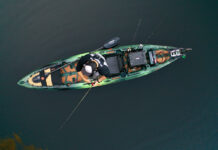
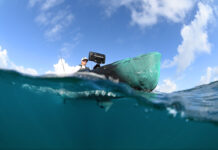
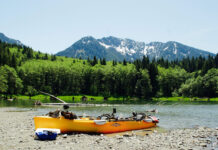
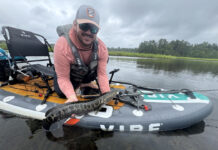
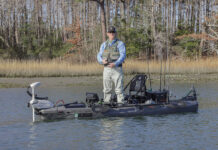

I really need to start experimenting with a “sit on top” style kayak. Right now I have a small plastic one where I sit down in it… it’s a bit restricting. Thanks, good article.